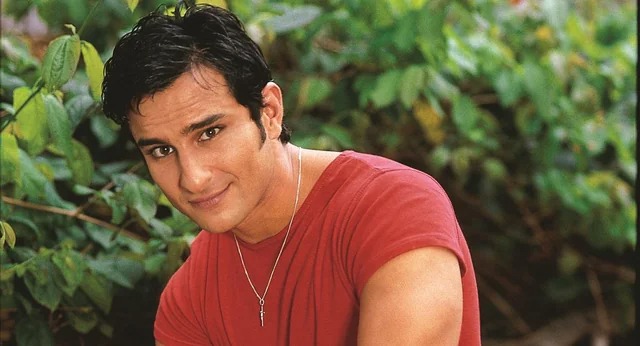Saif Ali Khan: A Comprehensive Biography Bollywood’s Royal Journey With Saif Ali Khan, who was born Sajid Ali Khan on August 16, 1970, is a well-known Indian actor and producer who has established a name for himself in the Hindi film industry with a diverse body of work that spans more than thirty years. Saif, a member of the renowned Pataudi family, has transformed from a romantic hero of the 1990s to a well-respected actor renowned for his skill and on-screen persona. He blends aristocratic charm with contemporary cinematic sensibilities.

Childhood and Family History
Mansoor Ali Khan Pataudi, the former captain of the Indian cricket team and the title Nawab of Pataudi, and Sharmila Tagore, a well-known Indian actress and member of the Tagore literary family, welcomed Saif into the world in New Delhi. The Pataudi family is well-known in both sports and culture because his paternal grandfather, Iftikhar Ali Khan Pataudi, captained the Indian cricket team as well.
His upbringing gave him a solid foundation in both Eastern and Western culture. Saif was exposed to affluent education and cosmopolitan ideas while attending The Lawrence School in Sanawar, Lockers Park School, and Winchester College in the United Kingdom. After a brief stint at a UK college, he returned to India to pursue a career in filmmaking.

Getting into Bollywood
Yash Chopra’s 1993 film “Parampara” marked Saif’s Bollywood debut. But it was the romantic musicals “Aashiq Awara” (1993) and “Yeh Dillagi” (1994), in which he costarred with Kajol and Akshay Kumar, that made him famous. Even though his acting abilities were still developing, he stood out for his boyish charm, dapper manner, and effortless on-screen persona.
He was regularly chosen for romantic or comedic parts in multi-star films like “Main Khiladi Tu Anari,” “Tu Chor Main Sipahi,” and “Hum Saath-Saath Hain” in the mid-to-late 1990s. Despite the financial success of these films, Saif was not yet known as a leading actor with significant depth and frequently took a backseat to more well-known actors.
Renaissance of Careers: 2000s
The Farhan Akhtar-directed film “Dil Chahta Hai” (2001) marked a sea change in Saif’s career. A new generation of viewers found resonance in his portrayal of Sameer, a charming and perplexed urban youth. Saif’s portrayal was highly acclaimed for its comedic timing and emotional depth, and the movie revolutionised modern Bollywood storytelling.

After that, he played a variety of roles, such as in “Kal Ho Naa Ho” (2003), in which he portrayed a character who was both sophisticated and emotionally complex, and “Hum Tum” (2004), in which he ultimately won his first National Film Award for Best Actor. As the sole lead in “Hum Tum,” he proved that he could carry a movie by fusing charisma and nuance in a romantic comedy style.
Saif Ali Khan portrays Nikhil “Nick” Arora, a carefree Melbourne chef, in the 2005 film Salaam Namaste. Without getting married, he begins living with radio host Ambar (Preity Zinta). Their relationship is put to the test as they deal with obstacles in real life, particularly when Ambar becomes pregnant. The movie is a contemporary romantic comedy that examines independence, love, and commitment in a modern context.
Also in “Parineeta” from 2005 revealed a more serious and mature side of Saif. He received praise from critics and was reaffirmed as a versatile actor for his portrayal of a conflicted lover, Shekhar Roy.
His most famous performance was probably in Vishal Bhardwaj’s 2006 adaptation of Othello by Shakespeare, “Omkara.” Saif shocked audiences with a career-defining negative role as Iago’s venomous and power-hungry character, Langda Tyagi. With chilling conviction, he abandoned his slick appearance and adopted the coarse, rustic dialect and manner, winning numerous accolades and widespread acclaim.

Broadening Perspectives: Creation and Novel Media
Saif became a producer in 2009 when he and Dinesh Vijan co-founded Illuminati Films. Their debut film, “Love Aaj Kal,” which starred Deepika Padukone and was directed by Imtiaz Ali, was a critical and financial success. It addressed contemporary relationships with a novel narrative approach and solidified Saif’s standing as a perceptive producer in addition to an actor.
“Agent Vinod” (2012), a spy thriller that garnered mixed reviews but demonstrated Saif’s willingness to take artistic chances, was one of the other productions under Illuminati Films.

Success in OTT and Later Careers
Saif experimented with roles and genres in the 2010s, with differing degrees of success. Urban audiences favoured films like ‘Cocktail’ (2012) and ‘Go Goa Gone’ (2013), but ‘Bullet Raja’ and ‘Happy Ending’ didn’t leave a lasting impression.
But with the rise of OTT, he witnessed a significant comeback. Saif played Sartaj Singh, a troubled Mumbai police officer looking into a mysterious cult, in Netflix’s “Sacred Games” in 2018, making him one of the first prominent Bollywood stars to embrace digital platforms. Saif’s performance was commended for its emotional depth and restraint, and the gritty series was a critical and financial success.
In films like “Laal Kaptaan” (2019), in which he played a bounty hunter, and “Tanhaji” (2020), in which he played the antagonist Udaybhan Rathod with flamboyance and menace, he continued to choose unorthodox roles and received another nomination for Filmfare.

Individual Life
Actress Amrita Singh was Saif’s first wife in 1991. Ibrahim Ali Khan, who is getting ready for his movie debut, and Sara Ali Khan, who is currently a successful actress, are the couple’s two children. In 2004, Saif and Amrita got divorced.
Taimur Ali Khan and Jehangir Ali Khan are the couple’s two sons. He married actress Kareena Kapoor in 2012. Taimur has been a social media sensation since birth, and the family is frequently in the spotlight and receives a lot of media attention.
Saif is well-known for his elegant way of living, passion for music and literature, and deep understanding of culture and history. He has frequently highlighted self-work and creativity as the reasons for his longevity in the field, despite his royal ancestry.

Honours and Acknowledgement
Saif Ali Khan has won various honours throughout his career, including:
- Best Actor National Film Award (“Hum Tum”, 2004)
- Best Male Debut, Best Supporting Actor, and Best Villain Filmfare Awards
- In 2010, India’s fourth-highest civilian honour was the Padma Shri.
- Several Stardust, Zed Cine, and IIFA awards
Influence and Legacy
In contemporary Bollywood, Saif Ali Khan is frequently regarded as a pioneer. He was one of the first actors to successfully make the switch to streaming services and helped create the “urban cool” genre. From romantic comedies to gripping thrillers, from heroic leads to villainous turns, his versatility demonstrates his artistic development.

Saif has maintained his relevance by consistently questioning both himself and the conventions of mainstream cinema, even in the face of early typecasting and being eclipsed by his peers. His selections exhibit a distinctive fusion of artistic aspirations and commercial appeal.
In conclusion
Saif Ali Khan’s journey, which took him from royal ancestry to the rough streets of Indian cinema, is an example of resiliency and creativity. In addition to being a well-liked actor, he is also a symbol of adaptability, ready to experiment, change, and amuse. Saif continues to make a lasting impression on Indian cinema, whether it is viewed on a large screen or on streaming media.
ALSO READ THIS: Swastik Chikara: 7 Secrets to Unstoppable Success



